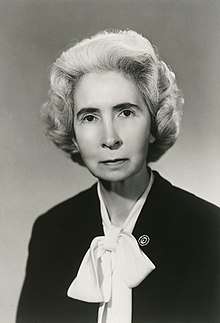Allene Jeanes
Allene Rosalind Jeanes (July 19, 1906 – December 11, 1995) was an American chemical researcher, whose studies focused mainly on carbohydrates and the development of Dextran, a substance that replaced plasma in the Korean War. A member of the American Chemical Society, Jeanes published over 60 works, compiled 24 presentations, and received ten patents.[1]
Allene Jeanes | |
|---|---|
 Jeanes, via the United States Department of Agriculture | |
| Born | Allene Rosalind Jeanes July 19, 1906 Waco, Texas, U.S. |
| Died | December 11, 1995 (aged 89) Urbana, Illinois, U.S. |
| Education | University of Illinois at Urbana-Champaign |
| Known for | Developing Dextran |
Early life and education
Jeanes was born July 19, 1906, in Waco, Texas to Viola (Herring) and Largus Elonzo Jeanes, a switchman and later a yardmaster for the Cotton Belt Route of the St. Louis Southwestern Railroad. In 1928, she received a bachelor's degree from Baylor University; in 1929, Jeanes obtained a master's degree from the University of California, Berkeley.[1][2]
From 1930 to 1935, Jeanes was employed as the head science teacher at Athens College in Athens, Alabama. From 1936 to 1937, she held a position as chemistry instructor at the University of Illinois.[1] She received her PhD in organic chemistry from University of Illinois in 1938,[3] after working with Roger Adams.[4]
Career
From 1938 to 1940, Jeanes served as a corn industries research foundation fellow for the National Institutes of Health (NIH) with Claude Hudson and worked at the National Bureau of Standards with Horace S. Isbell.[5]:105 In 1941 she joined Roy L. Whistler[5]:105 at the U.S. Department of Agriculture’s Northern Regional Research Lab (NRRL) in Peoria, Illinois as a chemical researcher. She worked there until 1976.[2] Jeanes is credited with "a prominent role in making NRRL a world-class center for applied carbohydrate science".[5]:105
Jeanes' area of research was natural polysaccharides, including starch (found in wheat, corn, rice, and potatoes), cellulose (found in cotton, wood, and paper), and dextran. Jeanes was able to isolate dextrose-producing bacteria from samples of bacteria-contaminated root beer supplied by a local Peoria company.[2] This discovery was the basis for development of a mass production process for dextran, and its use in a dextran-based blood plasma extender. This plasma substitute was used by medical personal in the Korean and Vietnam wars. As a result of her work, Jeanes was the first woman to receive the Distinguished Service Award given by the Department of Agriculture, in 1953.[6] She was also awarded the Garvan Medal in 1956.[3]
Jeanes was also part of the team that developed xanthan gum. Another polysaccharide, synthesized by the bacteria Xanthomonas campestris,[1] xanthan gum acts as a thickener and keeps foods such as oil and vinegar salad dressings from separating.[2]
She was a member of the American Chemical Society, Sigma Xi, and Iota Sigma Pi.[7]
Later life
Jeanes died on 11 December 1995 in Urbana, Illinois.
Awards
- 1953 – Distinguished Service Award from the USDA.[1][6]
- 1956 – Garvan Medal from the American Chemical Society.[1][6]
- 1962 – Federal Woman’s Service Award from the U.S. Civil Service Commission.[6]
- 1968 – Superior Service Award to the Xanthan gum team, from the United States Department of Agriculture[5][8]
- 1999 – posthumously inducted into the ARS Science Hall of Fame for her works in microbiological research that created life-saving polymers made from agricultural products.[9]
References
- "Allene R. Jeanes Papers, MS 335, Archives of Women in Science and Engineering, Special Collections Department, Iowa State University Library". Special Collections and University Archives. Iowa State University. Retrieved 2019-07-29.
- "Allene Rosalind Jeanes". Chemical Heritage Foundation. Archived from the original on July 12, 2016. Retrieved 23 October 2015.
- Ogilvie, Marilyn; Harvey, Joy (2000). The biographical dictionary of women in science. New York: Routledge. p. 654. ISBN 0-415-92038-8.
- Rothenberg, Marc (2000). "Adams, Roger (1889-1971)". The history of science in the United States : an encyclopedia (Online ed.). New York: Garland. p. 8. ISBN 0-8153-0762-4. Retrieved 23 October 2015.
- Gregory L. Côté, Victoria L. Finkenstadt: A History of Carbohydrate Research at the USDA Laboratory in Peoria, Illinois. In: Bulletin for the History of Chemistry. Vol. 33, Nr. 2, 2008, S. 103–111.
- "Allene Rosalind Jeanes". Human Touch of Chemistry. Archived from the original on 2014-05-14. Retrieved 13 May 2014.
- "Women Who Made a Difference". Iowa State University. Archived from the original on 6 July 2018. Retrieved 23 October 2015.
- Tiffany K. Wayne: American Women of Science Since 1900 (Vol.1: Essays A-H). ABC-Clio, 2011, S. 549 f.
- "National Center for Agricultural Utilization Research". Archived from the original on 2016-03-03. Retrieved 2008-07-06.
Further reading
- Shearer, Benjamin F. (1997). Notable women in the physical sciences : a biographical dictionary (1. publ. ed.). Westport, Conn. [u.a.]: Greenwood Press. ISBN 0313293031.
- Wayne, Tiffany K. (2011). American women of science since 1900. Santa Barbara, Calif.: ABC-CLIO. ISBN 9781598841596. OCLC 702118874.
- "Historical Inventors". LEMELSON-MIT.